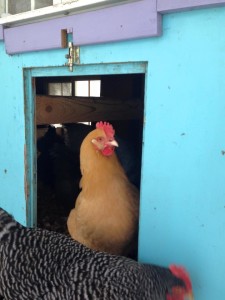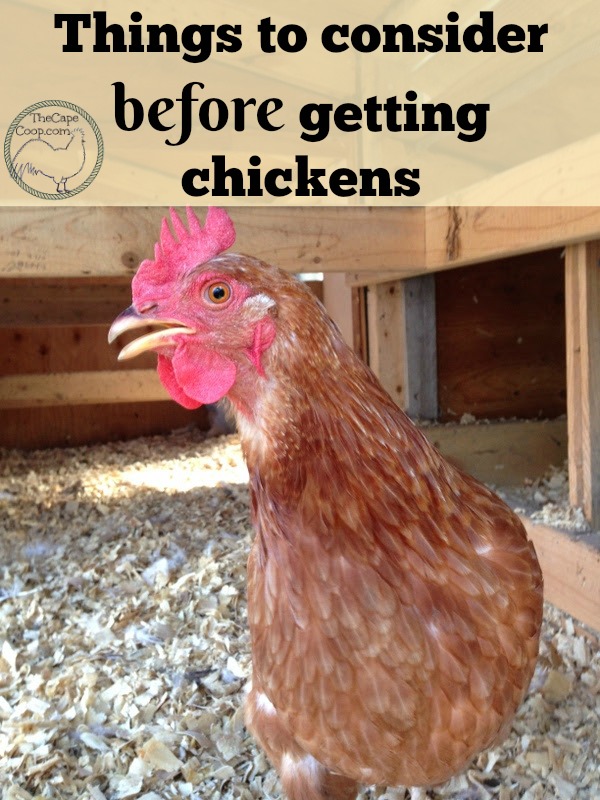---------------------------------------------------------
Chickens are great but there are a couple things you might want to think about before you commit to bringing those cute fuzzy chicks home. Remember, these are living animals and you are making a commitment to care for them properly.
Noise – Most people are aware that roosters can be quite noisy, and can crow at all hours of the day. Hens on the other hand, usually are quieter. That is not to say they don’t make any noise at all. Just like people, chickens have their own individual personalities, some are loud and some are quiet.
Hens sing an “egg song” when they lay an egg. They are really proud of themselves and want to tell the world! Sometimes their friends will join in the celebration or give a laying hen some encouragement by joining in the egg song. This can go on for a minute or two and can be very loud depending on the chicken. Like my chicken coop is about 20 feet from my house and I can hear it inside loud. With my windows shut. Not all of my chickens sing when they lay an egg, the ones that sing don’t sing every time.

In addition to the egg song there is the general chatter of hens. It is a lower, quieter noise that most neighbors shouldn’t object to. If you think the sounds of a farm will bother you or your neighbors do some research before choosing the breeds. Some breeds tend to be quieter than others. Brahmas, Australorps and Faverolles are all suppose to be quieter breeds. I think it really has more to do with the individual chicken than the breed though. I had a Brahma hen that honked, really often and really loud, she sounded just a goose!
Smell – Properly cared for chickens should not smell. If you neglect coop maintenance, just like if you neglect to clean a cat’s litter box, it will smell. The more chickens you have, the more often you will have to clean. Before you bring chickens home be sure you have a plan for the waste. Set up a compost area where you can dump dirty litter. If you add leaves and turn the compost once a week or so, even that should not smell. Click here to read about deep litter maintenance
Lifespan – Chickens in a secure backyard coop usually live 5-8 years, but they can live for up to 10 years or more! (Click here for my post on what to do with aging hens). A hen’s peak laying years generally end sometime between their 2nd & 3rd birthday. They will still lay eggs into their old age, but the frequency will become less and less the older they get. At a factory farm the hens are slaughtered when their production decreases . What you need to decide is what you will do at this point. Some will send the hens to the stew pot (if you can’t do the deed, you can pay a butcher to prepare it for you), some will allow the hens to live out their natural life (here you need to consider that you could have a flock of hens to feed with very few eggs in return), and others will give the hens away to people willing to take in retired hens.
Still on board? Here are a couple more topics to ponder while making your chicken plans.
Do you want to have a rooster in your flock? A rooster is not necessary for eggs. Click here to read more about adding a rooster. The girls will go about their business of laying eggs weather or not there is boy around to fertilize them. A rooster is only needed if you want to hatch out baby chicks.
Adding a rooster to your flock can help keep your hens safe. While the chickens are out scratching around the yard he will be constantly scanning the skies and tree line for danger. He will be willing to fight off any predators should they try to mess with his ladies. He will also seek out food and special treats to bring to his ladies as part of his courtship. Roosters are also helpful for cutting down on hens squabbling among themselves.
His job is to protect the hens from all danger – both predators and other chickens. On the down side, a rooster could see you as a threat. He could easily injure you or your child by jumping on you or pecking you. An overzealous rooster could also injure your hens with his spurs or beak during mating. It is best to have 8-10 hens per rooster, so he can “divide his time” without wearing out the hens. Even if you don’t intend on having a rooster you should still have a plan in case one of your new chicks turns out to be a male. Chick sexing is more of an art than a science and hatcheries can easily make mistakes. You should know for sure by 10-17 weeks if your chicken is a pullet or cockerel.
What type of predators do you need to protect your flock against?
When you are planning out your chicken set up take into consideration the type of predators in your area that would love a tasty chicken dinner. Here on Cape Cod my main concerns were hawks, raccoons, opossums, coyotes, & dogs/cats. Take into account the types of animals you need to protect your chickens from and how best to accomplish that when planning. Providing places to hide while free ranging is helpful for aerial predators, complex or multiple latches are needed to stop smart raccoons, buried wire in the run prevents predators from digging in.
What will you do if you have a sick chicken?
If you live in an urban or suburban area, many veterinarians are not prepared to treat livestock. You may have to travel a distance to reach the closest trained vet. Have the name and number of a vet that treats chickens handy just in case. Most times, the backyard chicken keeper will treat their chickens themselves with the help of other experienced chicken owners. If you aren’t lucky enough to be friends with someone else who keeps chickens, I highly recommend joining an online “chicken community”. Chicken people like to help each other out and can be an invaluable resource for those that are new to chickens. I found a really helpful Facebook group for homesteaders in my area – do a search to see if there is one for where you live, or start your own!
I would also recommend having a Chicken First Aid Kit on hand so you will be prepared for emergencies. Click here to see what is in my chicken first aid kit! If you have a sick chicken, you may need to quarantine the bird away from the rest of your flock so they don’t get everyone else sick. A large dog crate, set up in a shed, garage, or barn can be used for this. Click here to read my steps for diagnosing a sick chicken
Who will take care of the chickens when you go away on vacation?
Chickens are really pretty self sufficient. We have gone away for the weekend and just left out enough food & water to keep them. If you will be gone more than a couple days, you will need someone who is willing to stop by every day (or at least every other day) to make sure they have sufficient food & water and to collect eggs. A neighbor or friend will likely be happy to spent 5 minutes a day checking on your flock in exchange for tasty fresh eggs! We have so many farm animals that I feel better hiring a pet sitter to watch over the farm. We found a great pet sitter that will come by twice a day to open & close the coop, feed everyone, and clean up the stalls. She sends us twice daily updates by text. It’s definitely worth the piece of mind!









thuoc ga da
Tuesday 19th of March 2019
Thank you for sharing this very useful experience, I will keep this for practical application for better chicken care.
Kristi Wheeler
Thursday 15th of September 2016
Lol, We are pretty new to chickens. I haven't heard the egg song yet. I will have to look out for that one! They do love to bock over and over if I am not outside paying my full attention to them and bringing them treats! Spoiled brats!
Amber Bradshaw
Wednesday 10th of February 2016
One thing I would like to add to this great list is the county rules and ordinances along with your HOA or POA restrictions. The first rule of animal husbandry should be to be a good neighbor. The saying 'it is better to ask for forgiveness later than to ask for permission now" should not apply when adding livestock. I am speaking from experience of course.
Liz
Wednesday 10th of February 2016
I 100% agree. Being a good neighbor is always important!